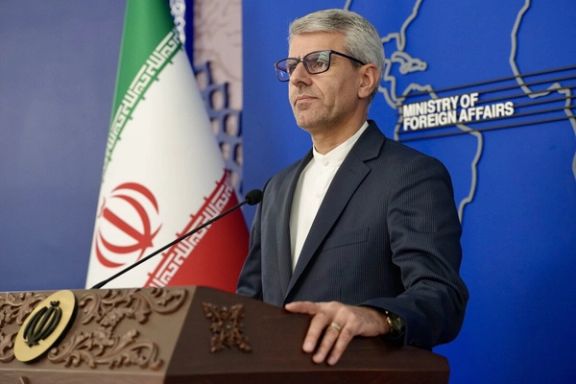Will Forcibly Take Our Water Rights From Afghanistan, Warns Islamic Republic

Esmaeil Baghaei, the spokesman of the Iranian Foreign Ministry, said that Tehran is using all means to secure Iran's water rights from the border and shared rivers.

Esmaeil Baghaei, the spokesman of the Iranian Foreign Ministry, said that Tehran is using all means to secure Iran's water rights from the border and shared rivers.
Baghaei said that since the planning of the construction of water dams in Afghanistan, the issue has been on the agenda of the Islamic Republic's follow-up.
According to IRNA news agency, in response to a question about the construction of dams in Afghanistan, Baghaei said, "The Ministry of Foreign Affairs, as the custodian of the country's diplomacy, has pursued the issue of supplying Iran's rights from the border and shared rivers as one of its fixed agendas."
The Iranian Foreign Ministry spokesperson added that the history of pursuing the issue of Iran's water rights from the Harirud border river dates back to the early 2010s.
Baghaei said at a press conference, "Since the planning for the construction of a number of dams inside Afghanistan was made, the issue was put on the agenda of the Islamic Republic of Iran's follow-up, and our objections in this regard were also recorded."
"The water that has flowed from Afghanistan to Iran over thousands or millions of years creates rights for all parties on both sides of the border," the Iranian Foreign Ministry spokesman said.
Baghaei said that in some cases, Iran has "specific documents and agreements”. Citing customary international law and taking into account "environmental considerations and, perhaps more importantly, the principle of good neighbourliness", he added, the Islamic Republic expects the Taliban to consider this issue "seriously".
According to Baghaei, Alireza Bikdeli, the Islamic Republic's ambassador to Kabul, is following up on the issue of the dispute over water rights, and in Tehran, "we are using all the facilities we have to follow up on the issue”.
Iran's water rights from the rivers on the border and shared with Afghanistan, especially in recent years when the construction of dams along the Helmand River has increased, has become a serious issue and in some cases a source of tension between the Islamic Republic and the former Afghan government, as well as the Taliban government.
Officials of the Islamic Republic have described the construction of water dams, including Salma, Pashdan, and Bakhshabad dams, as a serious threat to the downstream areas, including Khorasan Razavi, as well as Sistan and Baluchestan province.
The Helmand River is one of the main sources of water supply in the eastern regions of Iran, especially in Sistan and Baluchestan province. According to the 1972 treaty, Afghanistan is committed to securing Iran's share of water rights from the Helmand River.